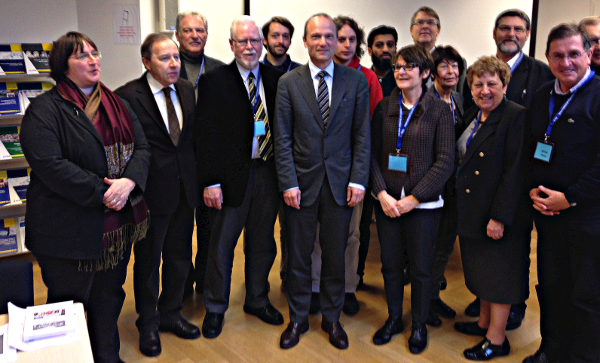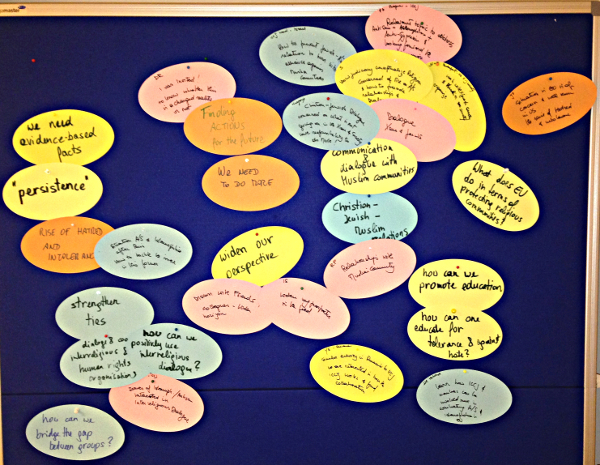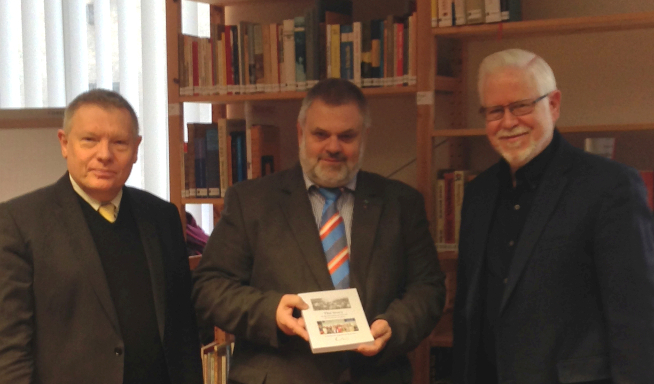 Members of the ICCJ Board, delegates of ICCJ’s European member organizations and guests from other institutions gathered from Australia, Austria, Chile, the Czech Republic, France, Germany, Hungary, Ireland, Israel, the Netherlands, Norway, Romania, Slovakia, Switzerland, the United Kingdom and the United States, for a series of special events and discussions in the Austrian capital. In addition to their business sessions, the Board members met with a range of Austrian civic and religious leaders and representatives of European political and cultural organizations. Central to the Board’s consultations at this meeting was the following question: “Are Antisemitism and Other Forms of Religiously Based Hostility Growing in Europe?” This concern has taken on a heightened sense of urgency in light of the recent events in Paris, and subsequent reactions to them in a number of countries. Obviously, a complex network of relationships exists between majority and minority cultures in any nation, and there is a spectrum of social responses that ranges from acceptance to prejudice. Each of the ICCJ’s Board members reported on the situation of Antisemitism and Islamophobia in their respective countries, and they invited a number of experts on those topics to address their gathering and share their insights and research.
Members of the ICCJ Board, delegates of ICCJ’s European member organizations and guests from other institutions gathered from Australia, Austria, Chile, the Czech Republic, France, Germany, Hungary, Ireland, Israel, the Netherlands, Norway, Romania, Slovakia, Switzerland, the United Kingdom and the United States, for a series of special events and discussions in the Austrian capital. In addition to their business sessions, the Board members met with a range of Austrian civic and religious leaders and representatives of European political and cultural organizations. Central to the Board’s consultations at this meeting was the following question: “Are Antisemitism and Other Forms of Religiously Based Hostility Growing in Europe?” This concern has taken on a heightened sense of urgency in light of the recent events in Paris, and subsequent reactions to them in a number of countries. Obviously, a complex network of relationships exists between majority and minority cultures in any nation, and there is a spectrum of social responses that ranges from acceptance to prejudice. Each of the ICCJ’s Board members reported on the situation of Antisemitism and Islamophobia in their respective countries, and they invited a number of experts on those topics to address their gathering and share their insights and research.
Tuesday’s working sessions were held at the offices of the Coordinating Committee for Christian-Jewish Cooperation, the ICCJ’s Austrian member organization. In the evening, the ICCJ delegation participated in the ceremony commemorating Holocaust Remembrance Day. In his address to that gathering, ICCJ President Dr. Philip Cunningham spoke of how the horrors of the Shoah had inspired a pioneering group of Jews and Christians to found the ICCJ in 1947. He spoke of the unprecedented level of interreligious friendship that has been born out of the bitter events of the Holocaust, and highlighted the hope that Jewish-Christian reconciliation offers to the world more broadly: “If, after something like 1800 years, Christians and Jews can take major strides in turning around their relationship from one of hostility and estrangement to the beginnings of friendship and solidarity, then this is a beacon of hope for many other (and shorter-lived) interreligious conflicts that beset our planet”. In addition, Dr. Cunningham gave several interviews to local and national radio broadcasters and newspapers.
<iframe width="560" height="315" frameborder="0" src="//www.youtube.com/embed/mox1mVs_3EY" allowfullscreen=""></iframe>
- Video: Moderation in German - Speech of the ICCJ President Phil Cunningham in English
- Text: pdf-file
 On Wednesday, the European Union’s Agency for Fundamental Rights (FRA) hosted a round-table discussion of different aspects of these issues. The group was cordially welcomed by the Director of FRA, Morten Kjaerum, and by Ioannis Dimitrakopoulos, Head of FRA’s department for equality and citizen’s rights; speakers during the morning session included Raimund Fastenbauer (Secretary General of Vienna’s Jewish Community), Katerina Vyzvaldova (FRA), and Ilja Sichrovsky (Secretary General of the Muslim Jewish Conference [MJC]). Their presentations addressed such varied topics as the Viennese community’s lived experience of bigotry and antisemitism, and opportunities for contemporary interreligious dialogue at the grassroots level. Yariv Lapid, the Director of the Center for Humanistic Education from the Ghetto Fighters’ House Museum in Israel and David Sandmel, the Director of Interfaith Affairs for the Anti-Defamation League (ADL) both addressed the participants, sharing further experiences from a wider global perspective. These expert panels were followed by discussion sessions in various working groups.
On Wednesday, the European Union’s Agency for Fundamental Rights (FRA) hosted a round-table discussion of different aspects of these issues. The group was cordially welcomed by the Director of FRA, Morten Kjaerum, and by Ioannis Dimitrakopoulos, Head of FRA’s department for equality and citizen’s rights; speakers during the morning session included Raimund Fastenbauer (Secretary General of Vienna’s Jewish Community), Katerina Vyzvaldova (FRA), and Ilja Sichrovsky (Secretary General of the Muslim Jewish Conference [MJC]). Their presentations addressed such varied topics as the Viennese community’s lived experience of bigotry and antisemitism, and opportunities for contemporary interreligious dialogue at the grassroots level. Yariv Lapid, the Director of the Center for Humanistic Education from the Ghetto Fighters’ House Museum in Israel and David Sandmel, the Director of Interfaith Affairs for the Anti-Defamation League (ADL) both addressed the participants, sharing further experiences from a wider global perspective. These expert panels were followed by discussion sessions in various working groups.
On Thursday, Vienna’s Jewish Community Centre kindly played host to the gathering for a concluding session that looked toward the future, and proposed plans to address the topics that have been the focus of these meetings.
At this time of challenge and promise, the work of the ICCJ and its members around the world seems more relevant and more necessary than ever.
 The ICCJ’s Vienna consultation was enabled by the generous support and help of the German Federal Ministry of the Interior, the Austrian Ministry of Foreign Affairs, the City of Vienna (Vienna-Leopoldstadt), the Austrian Coordinating Committee for Christian-Jewish Cooperation, the European Union Agency for Fundamental Rights, the Jewish Community Vienna, and the Archdiocese Vienna. The ICCJ Executive Board is grateful to our partners and friends in Austria, and especially Markus Himmelbauer (the Director of the Austrian Coordinating Committee for Christian-Jewish Cooperation), for the very warm welcome, and for the opportunity to delve into these vital topics in depth with their support and assistance.
The ICCJ’s Vienna consultation was enabled by the generous support and help of the German Federal Ministry of the Interior, the Austrian Ministry of Foreign Affairs, the City of Vienna (Vienna-Leopoldstadt), the Austrian Coordinating Committee for Christian-Jewish Cooperation, the European Union Agency for Fundamental Rights, the Jewish Community Vienna, and the Archdiocese Vienna. The ICCJ Executive Board is grateful to our partners and friends in Austria, and especially Markus Himmelbauer (the Director of the Austrian Coordinating Committee for Christian-Jewish Cooperation), for the very warm welcome, and for the opportunity to delve into these vital topics in depth with their support and assistance.
The ICCJ Executive Board has prepared a brief fact sheet called "Vienna Overview," which it hopes will be of assistance to national member organizations and to anyone concerned about interreligious amity.
(Pictures - from top to bottom:
Picture 1: The members of the extended ICCJ Executive Board together with the Director of the European Union Agency for Fundamental Rights, Morten Kjaerum [in the middle];
Picture 2: Results of the first brainstorming session;
Picture 3: Markus Himmelbauer [Director of the Austrian Coordinating Committee for Christian-Jewish Cooperation], Karl-Heinz Hora [Local Mayor of Vienna-Leopoldstadt], Philip A. Cunningham [ICCJ President])
